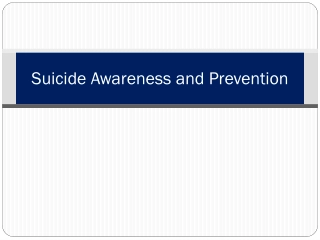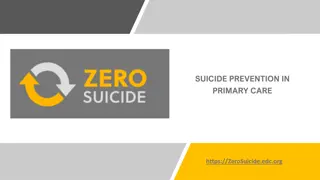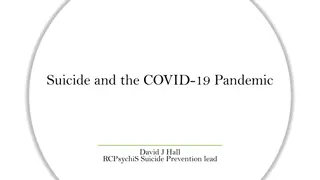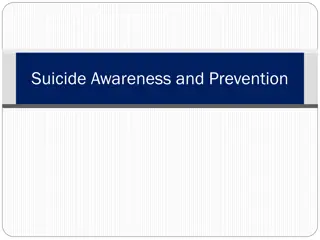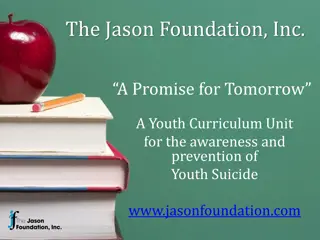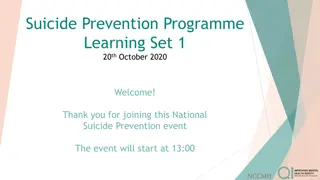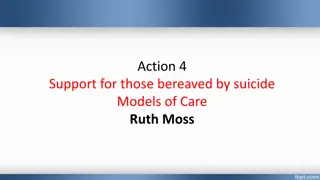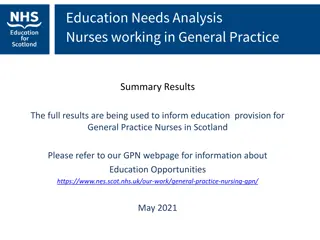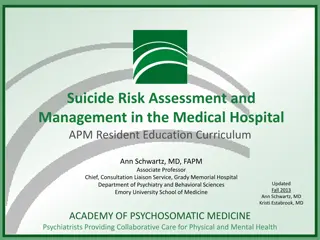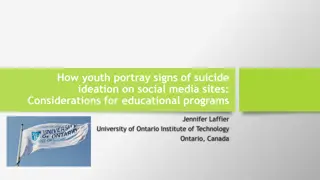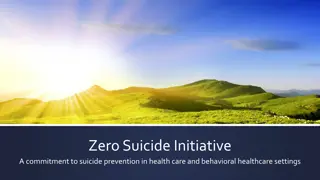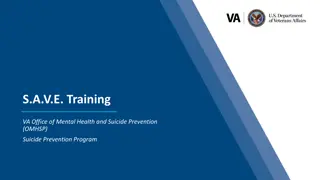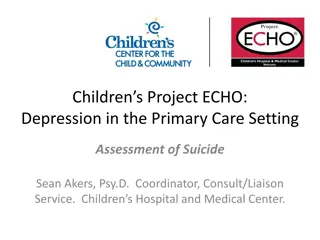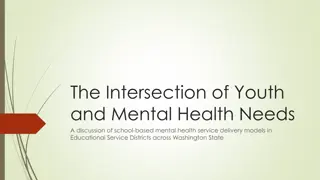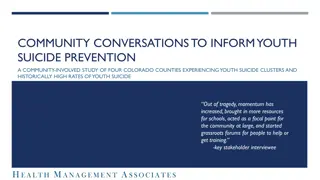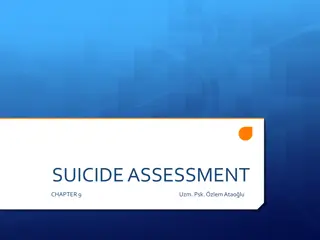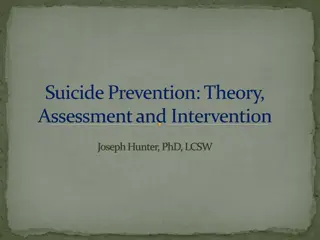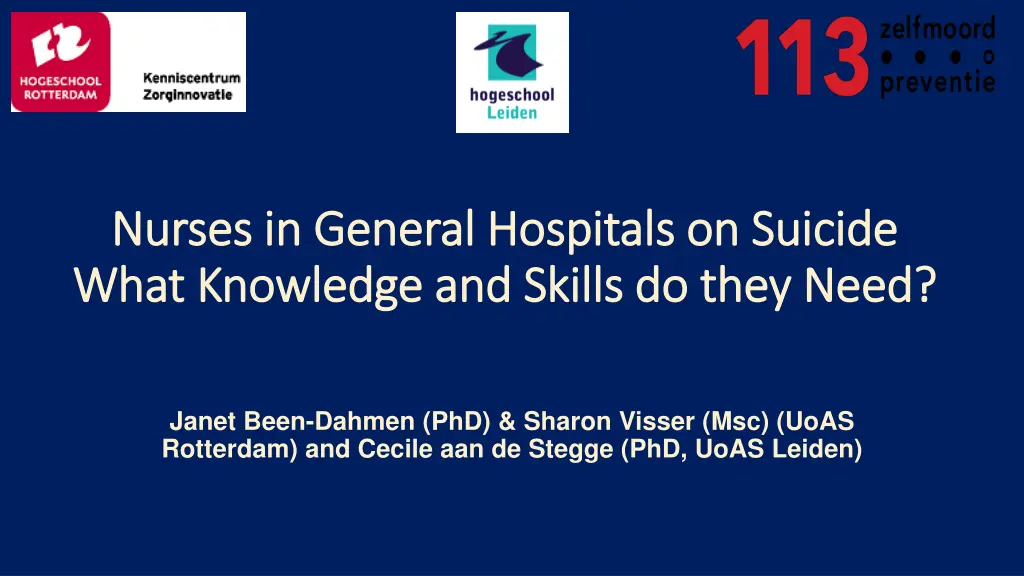
Knowledge and Skills Needed by Nurses in General Hospitals for Suicide Prevention
Explore the crucial knowledge and skills required by nurses in general hospitals to effectively interact with suicidal patients. Research highlights the lack of preparedness among emergency department nurses and the importance of training and support in addressing suicidal behavior in healthcare settings.
Download Presentation

Please find below an Image/Link to download the presentation.
The content on the website is provided AS IS for your information and personal use only. It may not be sold, licensed, or shared on other websites without obtaining consent from the author. If you encounter any issues during the download, it is possible that the publisher has removed the file from their server.
You are allowed to download the files provided on this website for personal or commercial use, subject to the condition that they are used lawfully. All files are the property of their respective owners.
The content on the website is provided AS IS for your information and personal use only. It may not be sold, licensed, or shared on other websites without obtaining consent from the author.
E N D
Presentation Transcript
Nurses in General Nurses in General Hospitals What What Knowledge Knowledge and Hospitals on and Skills do Skills do they on Suicide Suicide they Need Need? ? Janet Been-Dahmen (PhD) & Sharon Visser (Msc) (UoAS Rotterdam) and Cecile aan de Stegge (PhD, UoAS Leiden)
Background: M relle et al. (2018) state that more than 50% of the nurses who work on emergency departments lack knowledge, skills, and selfconfidence to talk with patients after suicide attempt and to estimate their acute risk. Janet Been-Dahmen (UoAS Rotterdam) and I (UoAS Leiden), both former mental health nurses with experience in general hospitals, have witnessed that comparable shyness of action towards patients with mental problems also exists on other wards in general hospitals. We have set up a research-project to find out what skills general nurses need. Sharon Visser (Nurse Practitioner Mental Health) took part in this after Janet was on leave.
Method: A qualitative study based on semi-structured interviews and informed consent formats Data: 39 typed and anonymized interview-texts, made by 5 students and/or 3 researchers of 2 different Dutch UoAS (stored audiotapes) Purposeful sampling approach: Registered nurses working in x general hospitals in The Netherlands Thematic analysis by the post-doc researchers with Atlas.ti
Topics in the interview guide (1) 1. Whether the ward is confronted with suicidal patients frequently; 2. The presence and use of hospital-protocols or - advices on how to relate with suicidal patients; 3. Former experience with suicidality among family members and/or friends; 4. Their own definition of suicidal ideations and suicidal behaviour; 5. Actual support they offer to suicidal patients on their ward; 6. Their feelings about caring for suicidal patients (in the setting of the hospital and their ward); 7. Their reaction upon colleagues who condemn suicidality; 8. Their own emotional reaction upon the despair of suicidal patients; 9. Whether they feel competent to talk about this despair and how they start;
Topics interview guide (2) 9. 10. A case in which they mean to have failed; 11. Important factors to ensure a nurse can succeed in engaging with a suicidal patient; 12. Important factors that predict failure of a nurse in engaging with a suicidal patient; 13. The support any ward should be able to give to a suicidal patient; 14. Willingness to take education for up-to-date professional knowledge of suicide-prevention; 15. Qualities a nurse needs to be able to support suicidal patients; 16. Elements they would present in case they would have to school their colleagues. A case in which they mean to have excelled;
Aim: At he end of each interview the nurse involved has offered in-depth qualitative information about the way he/she actually uses to give support to patients with suicidal ideations or behavior. He/she also elaborated on his/her existing or absent conversation skills and the nature of the knowledge he/she possesses or lacks to support this group of patients.
With this method we hope: 1. To provide 113 with in-depth information about the kind of education and skills that according to general nurses might help them to support suicidal patients in a more empathic, adequate and therapeutic way. 2. To make student nurses aware of the frequent appearance of suicidality and to prepare them for their future task of supporting patients with suicidal ideations or behaviour. 3. To contribute to the solving of two questions: - what extra knowledge should the curricula of our academies offer nursing and social work students? - what extra skills should 113 offer general nurses?
Today we merely present some first rough findings, for due to the recent pregnancy-leave of Been-Dahmen we are still analyzing. We will publish later this year.
Demographic variables TOTAL N = 39 interviews with registered nurses Gender Female 30 (76,9 %) Male 9 (23,1 %) Age in years 20 - 29 12 (30,7 %) 30 - 39 6 (15,3 %) 40 - 49 7 (17,9 %) > 50 13 (33,3 %) Educational level Registered Nurse 38 (97,4 %) Nurse Practitioner 1 ( 2,6 %) Years working in current job < 5 years 12 (30,7 %) 5 10 years 10 (25,6 %) > 10 years 15 (38,4 %)
TOTAL N = 39 Departments Emergency Intensive Care Unit Coronary Care Unit General Nursing Ward Psychiatric Ward Psychiatric Consultation Outpatient Clinic 7 ( 17,9 %) 9 ( 23 %) 1 ( 2,6 %) 17 ( 43,5 %) 3 ( 7,6 %) 1 ( 2,6 %) 1 ( 2,6 %)
Preliminary results: With regard to nurses on Emergency Departments and Intensive Care Units we subscribe the findings of M relle et al. (2018), for the majority of these nurses consider: Their ED or ICU no suitable setting to receive patients after suicide attempt Themselves unsufficiently schooled to handle distress or psychiatric disorder Themselves not truly interested to learn more about such themes Themselves primarily or even exclusively focussed on saving the lives of heavily injured or severely ill patients
A primary life-saving task requires a mentality that these nurses consider incompatible with explorating suicide risk or conversations about the question whether life is worthwile Citations: We are used tu run/react upon alarms and bleeps of technical instruments; suicidal patients do not bleep. Thus we tend to neglect them. Nursing a patient who is prone to die but doesn t want to, while simultaneously looking after a patient who longs for death is confusing. Sometimes I wonder: What am I actually DOING here?
Dont life-saving nurses see a task for themselves? Yes they do! But most of them consider this task as purely instrumental. Citation: It may sound disrespectful, but on such moments my role is to stitch a wound. And that is exactly what I tell these patients. I assure them I will stitch their wound as nice as possible, but that my work will be followed by a conversation between them and a doctor. Yet I DO ask them whether they feel an urge to entrust me with anything on their mind they would like to get rid of. They don t see a further psychological task for themselves, especially not when a patient returns frequently. Citation: If we see a patient return after his/her umpteenth suicide attempt, then, on a certain moment, we all have the reaction: Good gracious, it s him or her again!
The attitude of general nurses in other wards towards suicidal patients: Not all nurses in general hospitals are capable of considering patients with suicidal thoughts without prejudice or stigma Offering nursing care to suicidal patients or patients after attempted suide is for most of them not a familiar job They tend to refer these patients to other professionals, like psychologists, pastoral workers/humanistic counselors or the psychiatric ward They hesitate to talk about suicidality themselves, especially to have a real conversation about the wish to die Nurses on wards for branches of medicine with a less acute character, for instance internal medicine or oncology, seem most open-minded vragen)
Examples of nurses on other wards of general hospitals in case they are confronted with suicidality? Citation of a nurse on a surgery ward : If any patient would utter a longing for death I would first ask this person whether I could be of any help. I would also ask for his/her situation at home. Citation of a nurse on a geriatric ward: I usually say Yes, I have read that wish , but then I ask whether this wish is still actually relevant. Also I ask the person how he can be helped.
The near future: Before the verbal communication skills of nurses can be enlarged, we (our Academies of Applied Sciences?) should see to it that nurses who work in general hospitals consider dealing with sucidality as a part of their regular task. They must WANT to engage with suicidal patients. How to reach that point?

